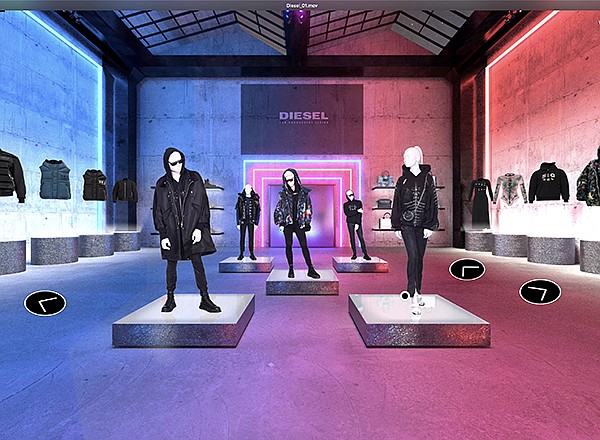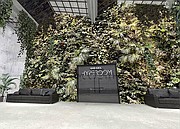VIRTUAL VENDORS
As More Trade Shows Go Online, Fashion Companies Also Seek Digital Alternatives
While a few in-person trade events such as L.A. Market Week have reopened, many other high-profile happenings have announced that their summer 2020 events have been canceled due to the COVID-19 pandemic. The situation has left many trade-show producers and vendors going virtual.
Seeking alternatives to on-site events has pushed fashion companies to develop new methods that can temporarily replace the in-person meeting. Italian denim brand Diesel is one such company developing new meeting platforms. On June 25, it introduced Hyperoom.
“One must look for silver linings whenever and wherever possible,” said Massimo Piombini, Diesel’s chief executive officer. “2020 has sparked an urgency to accelerate what we can offer and accomplish in the digital space.”
Diesel executives invite buyers to visit Hyperoom’s digital showrooms, which offer three-dimensional displays of Diesel collections with two-dimensional closeups of items with product descriptions.
Buyers can make orders on the platform through a live chat with a Diesel representative. The representative handles the virtual meeting like a trade-show appointment, showing off the collection and, if the meeting goes well, taking an order.
Cotton Heritage, a premium apparel-blanks company headquartered in Commerce, Calif., has developed a new meeting procedure for retailers and companies who may not want to take a live meeting, said Ken White, Cotton Heritage’s vice president of sales. The virtual meeting procedures were announced at the beginning of July, with the first meetings taking place the week of July 6.
With this new protocol, Cotton Heritage’s staff encourages buyers to schedule a meeting with a Cotton Heritage representative on the scheduling app Calendly. Once a meeting is confirmed, buyers talk to a Cotton Heritage representative through the Zoom video-conferencing platform. The first Zoom meeting is basically a 15-minute meet-and-greet to find out what categories of blanks interest the buyer.
Once the interests in blanks are confirmed, Cotton Heritage delivers samples to the buyer and schedules a longer meeting over Zoom.
“The key is to get product in the customers’ hands,” White said. “Our T-shirts are known for having a great hand and a great printability. So even people in lockdown mode should be able to interact with the product.”
White stressed that Cotton Heritage intends to exhibit at in-person trade shows once the events run again. However, the company has been developing its virtual-meeting protocol for a while. Many buyers have been requesting virtual meetings in the past few years. The COVID-19 crisis simply impelled Cotton Heritage to try out the digital protocol.
“This puts us with our customers in the way they want to work. This is our world now,” White said. “We’re not going to walk away from trade shows. The interaction with new customers at trade shows means more than anything to us.”
Cotton Heritage sales representatives and executives have held detailed discussions of how Zoom meetings should be handled. Technical issues of how to connect have been handled along with tips on how to make sales representatives’ home offices look a bit like showrooms. However, the success of these virtual meetings is not guaranteed, said Dean De Costa, a Cotton Heritage sales representative who handles the company’s accounts in such locales as Orange County, Calif., California’s Central Coast and the Pacific Northwest.
“It’s uncharted waters for us. The benefit is that it will allow us to reach out and connect with customers in a more personal way compared to a phone call,” De Costa said.
It’s also not guaranteed that every buyer will feel comfortable handling business online.
Fraser Ross of the Los Angeles–headquartered boutique company Kitson said that he would prefer to see new lines at an in-person trade show. He has not made orders at a virtual trade show because he had questions about privacy at these meetings. As a buyer in a competitive field, he did not want rivals to know what he was ordering. “Will there be 12 people on these Zoom meetings?” he joked.























